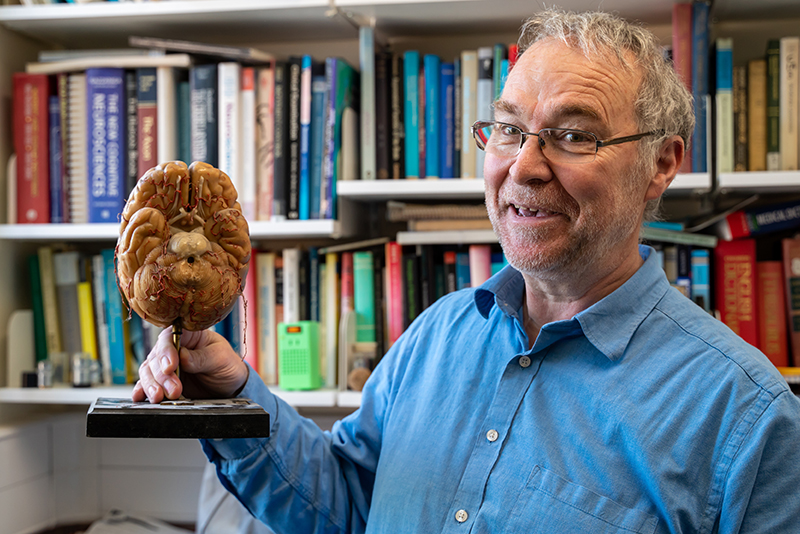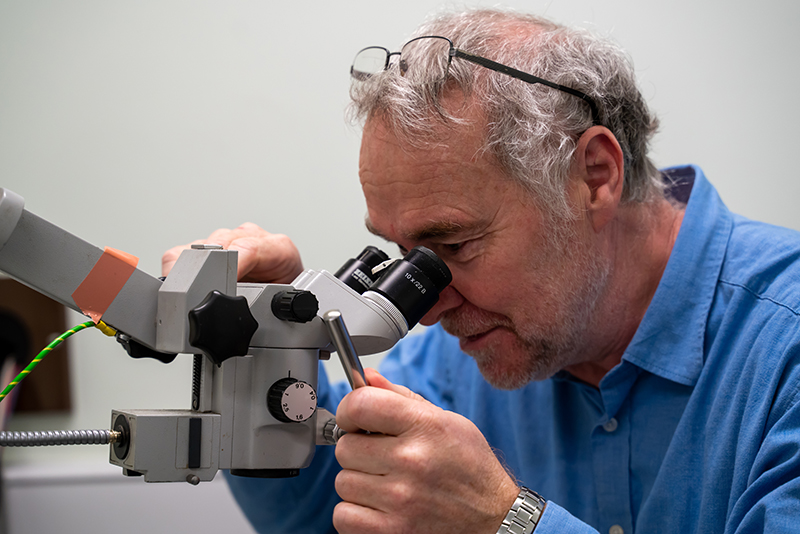Inside the head of a neuroscientist
"It is a privilege to be part of St John’s, I never tire of hearing about people’s research, meeting students and staff, and going to fascinating talks and incredible concerts"
Meet Dr Steve Edgley, neuroscientist and President of St John's.
You have been a Fellow of St John’s for more than 30 years. What brought you to the College?
I studied for a PhD in Bristol and worked as a postdoc in Sweden before coming to Cambridge as a lecturer in Biological Sciences. In my first year I supervised next door at Magdalene College, but was recruited by St John’s in 1989 to teach neuroscience and anatomy to medical students.
Can you tell us about your work as a neuroscientist?
Most of my neuroscience work over the last 10 years has been about trying to understand how we learn to move accurately. Our everyday movements are performed with very little conscious thought, and yet they are remarkably precise. A key thing about movement control is that it is not reactive, but proactive – you have to predict what is needed in advance. Human movement is incredibly sophisticated – robots may be able to beat people at chess but there isn’t a robot yet that can tie a shoelace as well as a five-year-old.

Why did you decide to stand for election as President?
You don’t really put yourself forward, others come and use their skills to persuade you to be nominated – people I respect very much twisted my arm. It is a big and very diverse role, and on the whole it has been fun – so far. It is a privilege to be part of St John’s, I never tire of hearing about people’s research, meeting students and staff, and going to fascinating talks and incredible concerts – it is a fantastic community. I’m more involved in College than I have been for many years.
What does the President of St John’s actually do?
At its simplest, the President represents the views of the Fellowship, inside and outside the College. The more complex part is standing in for the Master when the Master is not available or is away. Those two things form the core of what the President does for four years before the term is up. And there are all of those committees...
What are you hoping to achieve as President?
I’ll do my best to make sure the College remains a functioning collegial place. Our students have phenomenal potential and I hope that we can continue our mission to enable them to realise it. I have huge respect for the Fellowship, it is full of amazingly able people who have fascinating stories to tell.
What are the challenges?
The demands on academics in the wider University mean many people working in the sciences are not as involved with Colleges as they would have been in the past, and an increasing proportion are not involved with Colleges at all. Colleges are absolutely fundamental to the success of the University, as teaching and learning are right at the heart of what Colleges do. Support for the Collegiate system is threatened if new academics choose not to get involved – that’s one of the big challenges all Colleges face.
What is a day in the life of the President of St John’s like?
Being President is in addition to my day job as a researcher and as Head of Teaching in the University’s Physiology Development and Neuroscience Department. I’m supposed to spend about a day and a half a week in College – it seems like more, but no two days are likely to be the same. Many varied issues pop up unexpectedly with the dreaded words “have you got just a minute?”. The role definitely involves a lot of long meetings about important things and sometimes about not quite such important things!

What do you like to do in your spare time?
Free time is a rare commodity. Like a lot of academics, my research is my major hobby. I’m interested in the natural world, and spend a lot of time in the garden. I like reading and walking in remote places – the more remote the better. I’ve got three children that I don’t see enough of at different universities across the UK.
What is the life of an academic like?
It is a vocation. All of us put in long hours, so relatively few of us have the same level of free time as most people in the outside world. The problem with research is that you’re only as good as your most recent work – what you did 20 years ago is often forgotten, and there are lots of really bright people snapping at your heels. That keeps you awake at night.
This interview appeared in the Lent 2020 edition of Eagle Eye.
Published:26/02/2020